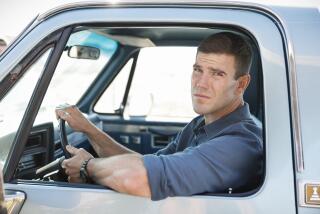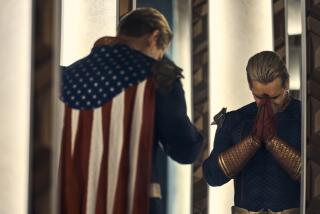Review: Walls as a means of isolation: In USA’s ‘Colony’ tyranny rules the land
- Share via
USA rarely gets the credit it deserves. In all the recent frenzy over the neighborhood renaissance and subsequent overcrowding of television, the NBCUniversal-owned basic cable network never seems to get the creative shout-outs given HBO, AMC, FX or any of the new streaming services.
But it was USA that first made “characters welcome” and gave us “Monk,” the twitchy template for the legion of psychologically afflicted lead characters that followed.
It was also USA that dared to premiere its big shows in the summer and tailor the tone of those shows to their airdates. Bright and breezy caper shows like “Burn Notice” and “White Collar” became known as “blue sky,” their stars wisely marketed as “the boys [and eventually girls] of summer.”
Winter TV: Your guide to the new shows
And when the novelty wore off and other networks caught up, USA successfully made a 180 pivot, dimming its blue to gray with “Mr. Robot,” a dystopian tale that shook with the night sweats and hoodied paranoia of its main character.
Quickly winning the hearts of critics and, more recently, two Golden Globes, “Mr. Robot” was the perfect reboot, which makes it a pretty tough act to follow.
As “Colony,” USA’s new sci-fi drama, is about to discover.
Co-created by Carlton Cuse and Ryan Condal, “Colony,” like Cuse’s “Lost,” explores the actions of normal people under abnormal circumstances through an overlay of growing suspicion that all is not what it seems.
“What’s really going on?” quickly becomes as big a question as “What will happen next?” as episodes jammed with plot remain often maddeningly opaque. Although “Colony” has a much more controlled narrative than “Lost” ever did, it’s difficult not to, you know, worry. That things left intentionally vague on screen are just as vague in the writers’ room.
Set in Los Angeles after an apparent alien invasion, “Colony” has two immediate attractions: the presence of three beloved stars of iconic shows — Josh Holloway (“Lost”), Sarah Wayne Callies (“The Walking Dead”) and Peter Jacobson (“House”) — and a Very Big wall.
The stars give the show life — Holloway and Callies play an easily likable married couple with an increasingly complicated relationship, and Jacobson shines greasily as spokesman for the new overlords — but the wall gives the show meaning and potential relevance.
Huge partitions, exactly the sort envisioned by certain presidential candidates, divide L.A. into blocs and social strata: The Green Zone, for example, is where the rich people live, including Hollywood executives turned collaborators.
The action begins a little more than a year after what is referred to as “the Arrival.” Mention is made of spacecraft and violence — many died or went missing — and Los Angeles now exists apart from the nation and the world, controlled by an occupational army of humans called Red Hats run by a select few, including Jacobson’s Proxy Snyder, who claim to do the bidding of “Our Hosts.”
Violence continues in battles between this occupational government and a band of rebels, headed by someone called Geronimo and repeatedly referred to as terrorists.
See more of Entertainment’s top stories on Facebook >>
But it’s the wall that embodies the tyranny of the new world’s containment, oppression and fear. A city, and presumably a nation, has been divided by these walls, as has its population, down to specific families.
Including and especially the Bowmans, initially known as the Sullivans. Will (Holloway) and Katie (Callies) somehow became separated from their youngest child, Charlie, during “the Arrival.” Charlie is now living, presumably, on the Santa Monica side of the wall. We meet Will, a former FBI agent now working in as a mechanic, in the midst of an attempt to retrieve him.
It doesn’t work, of course, and Will is arrested. Instead of being “sent to the factory,” the ultimate threat, Will is approached by Snyder and tasked with finding Geronimo. In exchange, Snyder will find Will and Katie’s son.
With food and medicine in short supply, most folks are just trying to survive and avoid “the factory,” but others fight back, and things quickly take on the kind of spy versus spy story line so beloved by Brits and so often screwed up by Americans who are only just beginning to appreciate the varying shades of bleak.
But this is not “Tinker, Tailor” territory. No matter what is really going on, “Colony” is a hero’s quest, and that hero is Will. Katie too, maybe, and perhaps a few others, including Will’s partner (Carl Weathers), but mostly Will.
Holloway is a performer of such deeply humored humanity that we know, in an instant, he is no collaborator. Not really. Sure, he’s doing a better job tracking down the rebels, impressing his new boss (the always wonderful Kathy Baker). But he’s just doing it to save his son and then, we assume, the world.
Cuse and Condal have repeatedly cited a “fascination” with everyday life in Paris during the Nazi occupation as the basis for “Colony,” a queasy reference since that fascination is expressed in a narrative far more “Die Hard” than “Casablanca.”
The body count of “Colony” is extremely high, with little thought given to the humanity of countless rebels, civilians and even Red Hats who die on an episodic basis. “Colony” is more thriller (cannon fodder required!) than deep character drama (killing people takes its toll!).
The absence of actual aliens is just as tricky. As with ghost stories, invasion tales almost inevitably go south when the monsters are revealed, with their silly big heads, snake tongues or devil horns. But having them so conspicuously absent is just as distracting.
Certainly these aliens seem less than omnipotent — sure, they can build an amazing wall, but their drones look pretty beaten up, and the origins of Geronimo’s radio transmissions continue to elude them. Quite possibly, they are keeping their distance because they too have seen “War of the Worlds” and are busy testing the atmosphere and the populace for potentially alien-wipeout germs.
Or maybe they’re not so fierce at all. Maybe “collaboration” is more accurate a term than it seems.
Raising such questions adds as much narrative danger as drama. Big Reveals, as we have seen, most recently in “The Dome,” “Wayward Pines,” “Revolution” and, of course, “Lost,” can be confusing, limiting and maddening.
Or, as in the case of “Mr. Robot,” mind-blowing.
As “Colony” appears far more interested in its people than its über plot, we’ll hope for the latter. Holloway and Callies make a fine and troubled team, and the rest of an increasingly remarkable cast headed by Baker is rolled out with promising lack of fanfare. Weathers seems initially underused, as does Amanda Righetti as Katie’s sister and “Episodes’ ” Kathleen Rose Perkins as Will’s new colleague. Ally Walker doesn’t show up in early episodes.
If nothing else, “Colony” has provided its heroes with some pretty great backup.
Twitter: @marymacTV
------------
‘Colony’
Where: USA
When: 10 p.m. Thursday
Rating: TV-14 (may be unsuitable for children under the age of 14)
More to Read
The complete guide to home viewing
Get Screen Gab for everything about the TV shows and streaming movies everyone’s talking about.
You may occasionally receive promotional content from the Los Angeles Times.







